Can Periodontal Disease Kill my Dog? [Dog Gum Disease FAQ]
Our canine buddies are the most precious members of our family. All owners want their pet dogs to be healthy. And to ensure that, caring dog owners take great pains to ensure a proper diet, routine checkups, tons of exercise, regular grooming, and lots of love and care.
But one of the health concerns that most pet parents usually take for granted is oral health. The gums and teeth of your pup are rarely given priority when they are, in fact, two of the most important parts of your dog’s body. Can periodontal disease kill my dog?
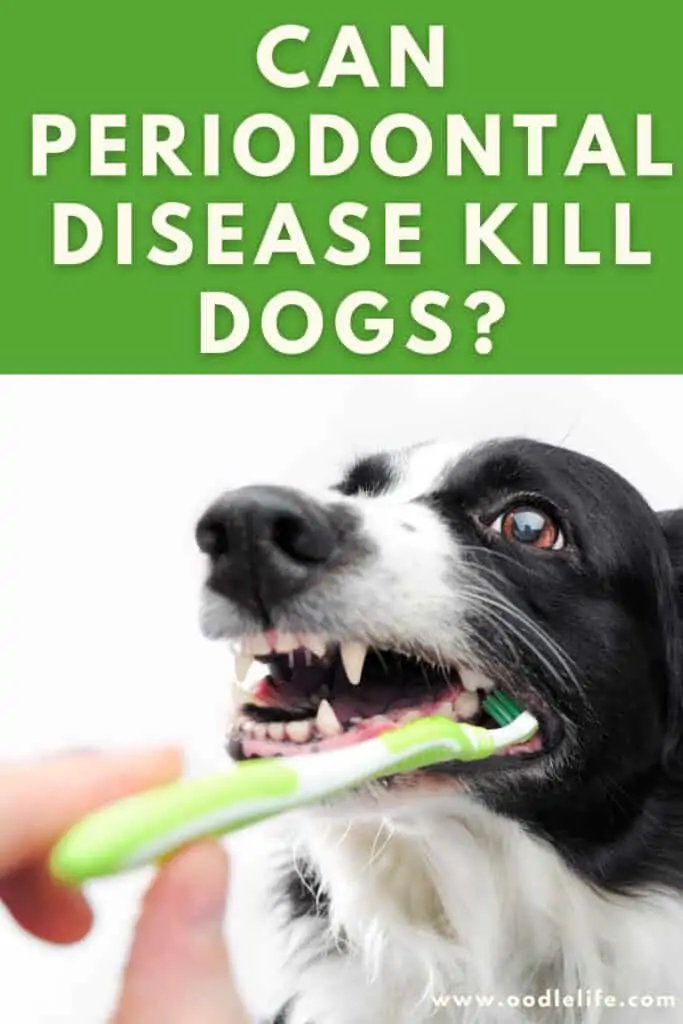
Studies show that gum diseases in dogs are the most common health concerns impacting your dog’s health. And unfortunately, 80% of dogs have already developed some type of dental disease once they’ve reached two years old.
Having an understanding of this gum disease is critical, so you can take immediate action to safeguard your dog’s health before it leads to something more severe.
This article has been reviewed by a human dentist with periodontal disease research experience (teethFAQ) and also a Veterinarian. The information is however just for general advice and education - consult your own dogs Vet to match your specific circumstances.
What is Periodontal Disease in Dogs?
Periodontal disease is the aftermath of untreated gingivitis.
Gingivitis in dogs is almost similar to what you might experience when your gums are inflamed. It is a condition caused by the development of plaque on your dog’s teeth.
Gingivitis and periodontal diseases can be prevented, but because of neglect – in most cases, unconscious negligence – it becomes a recurrent medical problem.
This can be very uncomfortable for your canine buddy that, if ignored, can worsen and cause serious disfigurement and even death. Periodontal disease is also not limited to specific dog breeds; all types of dogs are susceptible to it.
Causes of Periodontal Disease in Dogs
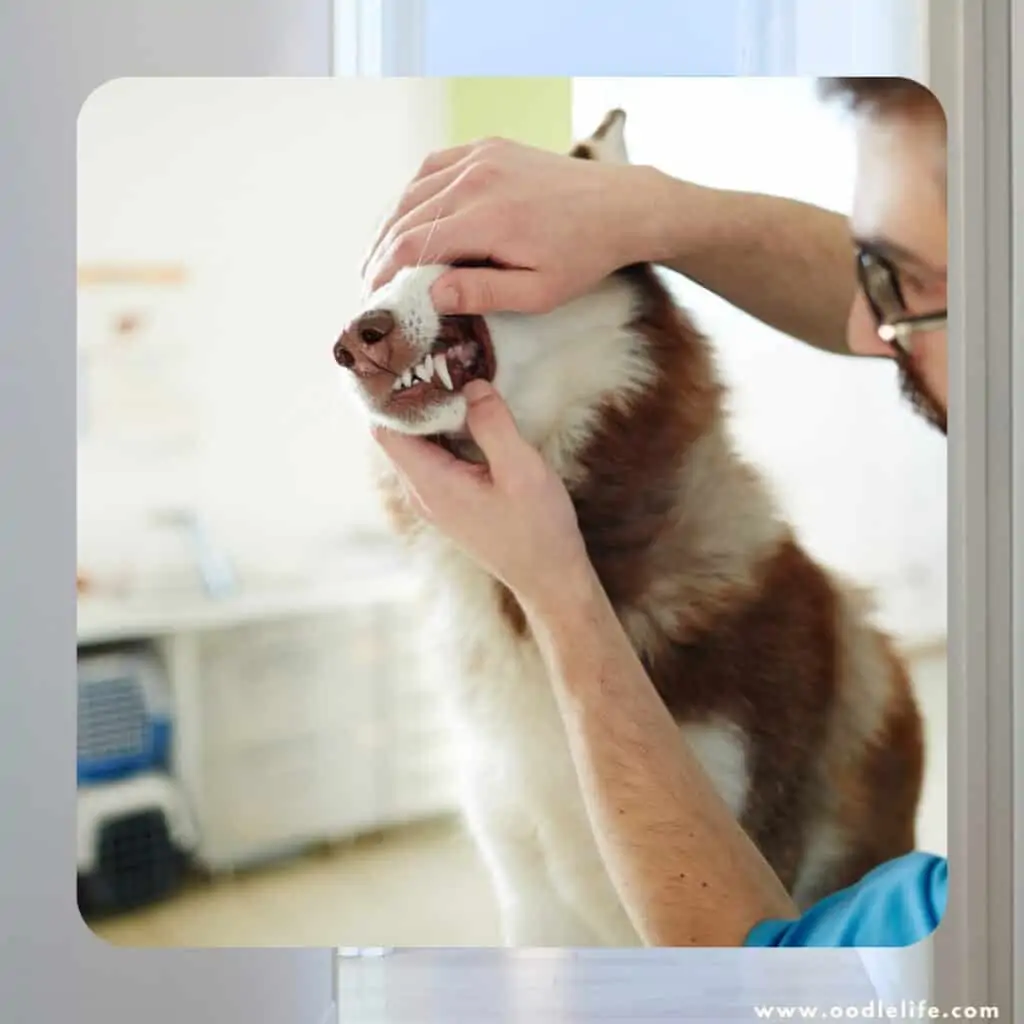
The main culprit of this oral disease starts with fragments of food that get stuck in the teeth. This leftover food causes plaque (bacteria growth) that will lead to gingivitis and eventually to periodontal disease.
Although all dogs can have periodontal disease, it is apparent that a dog’s breed can affect the likelihood of the dog developing plaque. Smaller dog breeds and those who usually have crowded teeth are more likely to develop the periodontal disease because it is hard to clean between their choppers. Breeds like Chihuahua, Lhasa Apso, Cavalier King Charles Spaniel, Pugs, Maltese, Yorkshire Terrier, and Shih Tzu are good examples.
Older dogs are also more vulnerable to having this disease because of broken teeth and poor nutrition. They also have a weaker immune system to fight off the bacteria from the initial gum disease.
Symptoms of Periodontal Disease
It can be a bit challenging for dog parents to catch the early signs of gum disease. Usually, the only time one recognizes that something is wrong is when it is already a little too late. Don’t let the situation worsen to the point of an actual periodontal disease forming before you take action. It is best to be aware of warning signs and take your dog to the vet.
Here are the symptoms you would notice if your dog is in distress from gum disease.
Possible Complications of Dog Gum Disease
The three most noticeable complications of periodontal disease are bone loss, gum loss, and tooth loss.
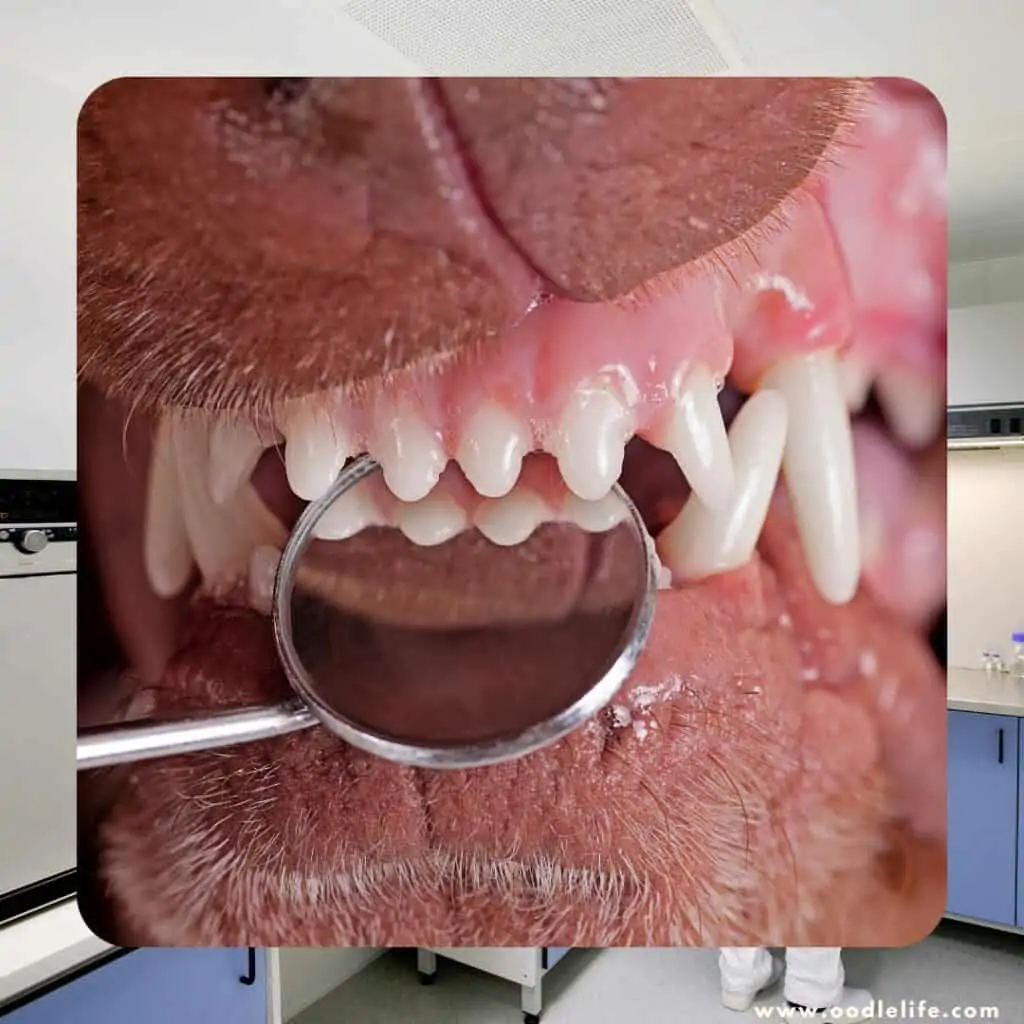
Over time, the decay in your dog’s teeth or jawbones can get so extensive that your dog’s jaw can easily get fractured with the slightest pressure.
Bacteremia is the infection that causes your dog to experience bone loss. But more than that, it can infect your pup’s actual blood. This can further progress to sepsis that can spread to different organs and become systemic.
Periodontal disease can cause your dog to be at a higher risk of developing kidney, liver, and heart disease, eventually causing these organs to malfunction and stop working. So yes, periodontal disease can kill your dog.
What are the Best Periodontal Disease Treatments?
Treating periodontal disease involves long-term and consistent care. There are various treatments that your vet may use depending on the current state of your dog’s periodontal disease and the seriousness of your pet’s oral health problem.
Canine Mouthwash
Yes, mouthwash for dogs is a real thing. Canine mouthwash can keep your fur-baby’s oral health in excellent shape.
It is formulated with canine oral health in mind and thus ingesting it will have no adverse effects. Dog mouth-washing is very beneficial in eliminating the persistent build-up of plaque.
Anti-inflammatory Drugs
Your vet may also prescribe your dog a non-steroidal anti-inflammatory drug to address the pain caused by gum infection around your pet’s tooth. These anti-inflammatory drugs are also expected if your dog goes under surgery.
Antibiotics
Another medicine that your vet can give will be antibiotics. This can help fight off the tooth infection, specifically if there is a tooth abscess that is typically seen with periodontal disease. Abscessed tooth pain usually requires this type of treatment.
Your dog would typically be placed on antibiotics for several days before a serious dental cleaning. Additional dosage may also be given after the cleaning.
Dental Cleaning
This is a serious procedure where your dog needs to be under anesthesia. The objective of dental cleaning is to remove the majority, if not all, of the tartar and plaque build-up.
While your dog is unconscious, vets usually take the time to take an x-ray and complete dental exam so they can check for any other complications related to your dog’s bones and teeth. This is essential when treating periodontal disease because there may be underlying problems beneath the gum lines.
Ways to Prevent Dog Periodontal Disease
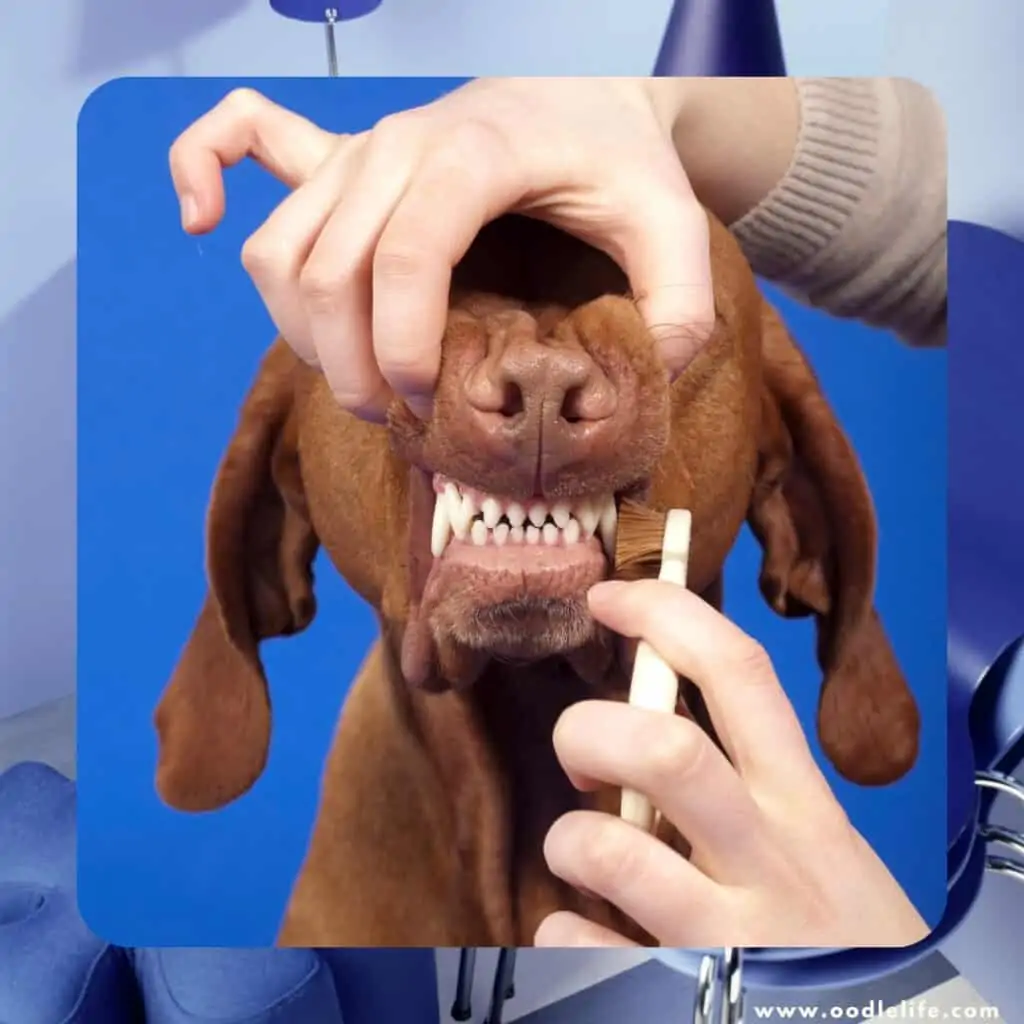
Brush, Brush
The simplest way to stop this disease is to make tooth-brushing part of your dog’s daily routine.
The best way to get your best bud’s teeth brushed twice daily is using animal-safe toothpaste.
Daily brushing and even flossing can control plaque build-up. Even if you can’t do this every day, try to be as regular as possible, so you can be sure to be on top of this issue.
Ideally, you should start brushing your dog’s teeth when it is still a pup so that it becomes a habit for both of you. The earlier you introduce a toothbrush to them, the lesser they will fear this oral ally.
Dental Check-ups and Cleaning
It is also preferable that you do a semi-annual overall wellness check and have periodic dental visits so any accumulated dental build-up can be addressed right away.
It will be best to discuss the most feasible preventative dental plan for your pooch with your vet as soon as possible. You may also need to have a sit down with your pet insurance provider about this because dental health issues and treatments may be something your insurance does not cover.
Take into account that if you take your dog to visit your vet religiously to have his choppers checked, then the likelihood of having to battle anything serious disease is extremely low. This is how you can avoid a tooth extraction or the rare dog tooth decay.
Following a Healthy Diet
This is more on you as the dog parent because your dog will eat anything you offer it. And so, as much as possible, try to resist those adorable puppy eyes and control the sugary treats as this is one of the leading reasons for bacteria build-up.
Many vets will recommend a diet including occasional raw meaty bones, which is also beneficial for your dog’s oral health. It gives them something to gnaw on while also helping keep their gums clean.
Raw food has natural enzymes that help prevent plaque, leading to healthier gums and teeth.
Chew Toys and Treats for Chewing
There is nothing wrong with rewarding treats to your fur-babies so long as it is done in moderation. To keep you and your dog happy, consider tooth-friendly toys and treats that you can occasionally incorporate into your dental health care routine.
These treats can satisfy your pooch’s natural desire to munch on something while strengthening their teeth. Most of these dog chews are rich in enzymes, and chewing on them actively will get rid of tartar and harmful bacteria (plaque) from the gums and teeth. It is oral hygiene through play.
What Happens If Periodontal Disease is Left Untreated?
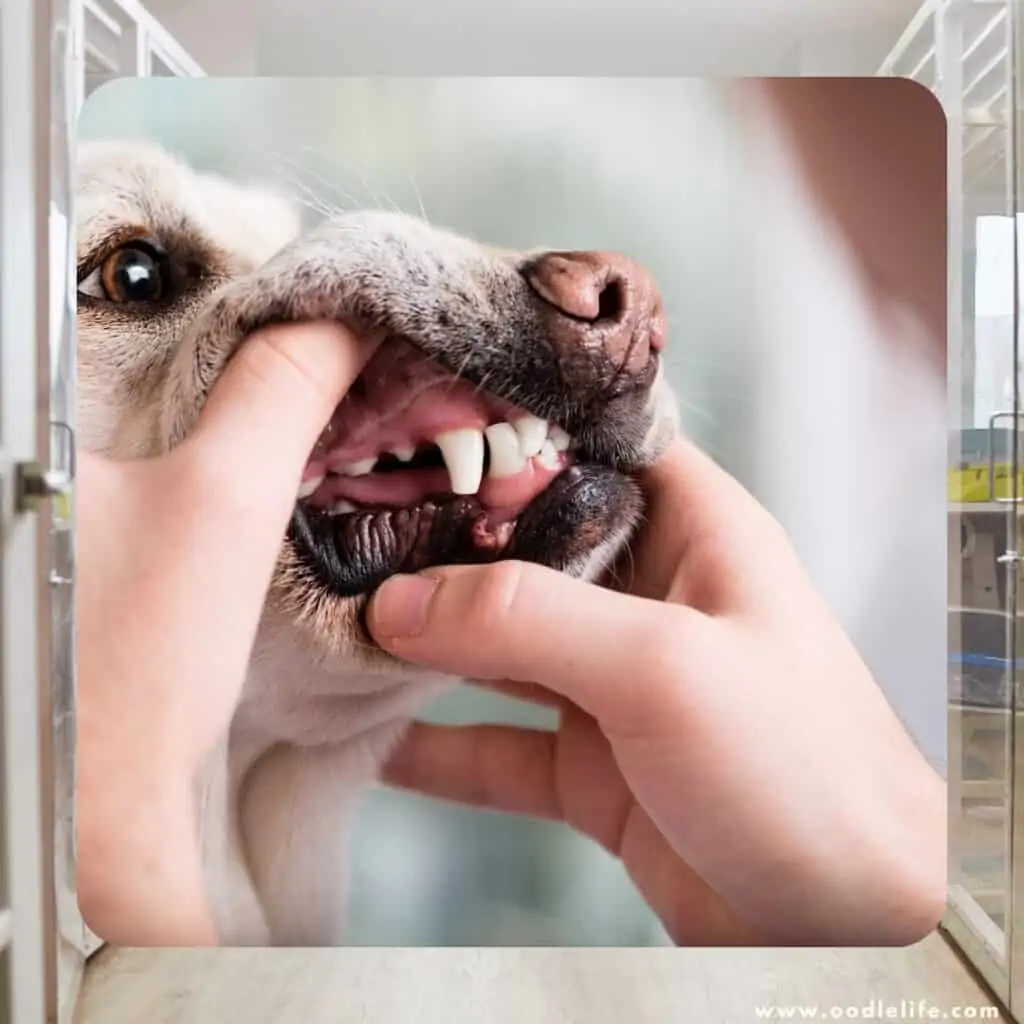
If untreated, periodontal disease can turn irremediable and lead to irreparable damage and loss of teeth. This disease is characterized by your dog’s tooth detaching from the socket and gums.
Furthermore, periodontal disease can cause tooth abscess, another painful dilemma for your dog. Your vet would prescribe antibiotics, but the impacted tooth will have to be surgically removed.
Aside from organ failures as another consequence of this disease, studies show that it can also result in pre-existing diabetes in dogs to worsen.
Dogs that have already been diagnosed with diabetes are known to have higher chances of developing periodontal disease. Unfortunately, these two go hand-in-hand. The more the periodontal disease worsens, the more diabetes progresses too. And if diabetes escalates, so does the periodontal disease, and a destructive cycle begins.
Frequently Asked Questions
Why does my dog have bad breath?
This is one of the symptoms of periodontal disease. Bad breath is caused by the bacteria that are responsible for plaques.
Is it normal for my dog to have a tooth fall out?
The follow-up question here is, how old is your dog? If your dog is still a puppy with deciduous or baby teeth, then yes, it is normal for a tooth to fall out.
But if your dog is past six months, then it is not normal for any tooth to become loose and fall out voluntarily. This may be a symptom of severe periodontal disease. To confirm the possible diagnosis, your pet needs to go through a series of dental X-rays so they can receive the appropriate treatment.
Can hard kibble improve my dog’s gum problems?
There is no definitive information about whether the overall feel of your dog’s food can further affect its gum problems. But obviously, if it is hard and your dog already has a pre-existing oral problem, then it would be more difficult for your dog to chew hard kibble. It may even lead to bleeding of the gums or, in worse cases, cause your dog’s jaw to break.
On the other hand, soft kibble is also a possible threat because it is more likely to leave residue inside your dog’s mouth. So regardless of whether you are giving your dog hard or soft kibble, make sure that you brush your dog’s teeth daily. This is the most foolproof way of preventing any gum problems.
My dog was recommended to have surgery. Is anesthesia safe for my dog?
Before giving your dog anesthesia, your vet will conduct a thorough evaluation. A complete physical examination will be conducted to check your pet’s overall health before your pet can be cleared to be given anesthesia.
Complete blood work is also done to screen out any occult diseases that can make using anesthesia riskier. Should the use of anesthesia be a more significant threat, your vet will provide you with alternatives.
Rest assured, if anesthesia is used, then it will be closely tracked before, during, and after the surgery.
After the surgery, how will my dog eat?
Dogs are more resilient than you think, and if your dog was in pain before surgery because of an impacted tooth, it would be relieved to be eating again without any discomfort.
Dogs don’t eat with a complete set of teeth, so after a tooth was removed, you can expect them to be eating normally after a few hours. If it was a deep-cleaning operation, you may notice that they eat slower than usual, but they will manage to eat one way or another.
To help them out, you can give them smaller portions of soft kibble or a wet diet for the time being. If you’re still unsure, you can always consult your vet.
Conclusion
Dogs live longer with healthier teeth and gums. And a simple plaque problem, if ignored, can cause your dog to face a periodontal disease that is fatal.
Regular dental cleaning, together with a healthy diet and consistent dental care can be your dog’s saving grace from this painful experience.
So if you find your dog looking uncomfortable or letting out moans and whines while chewing, don’t ignore it!